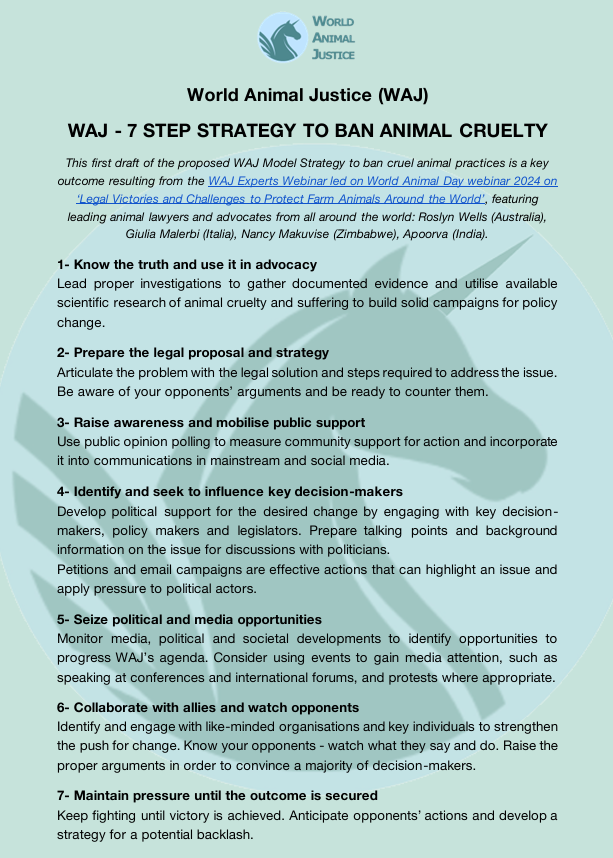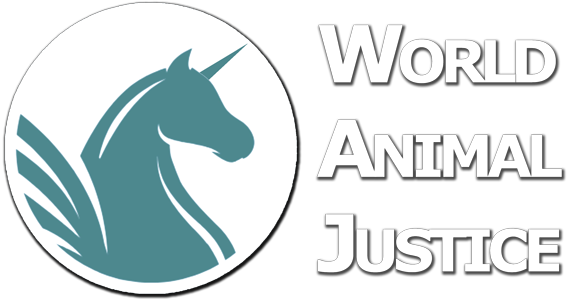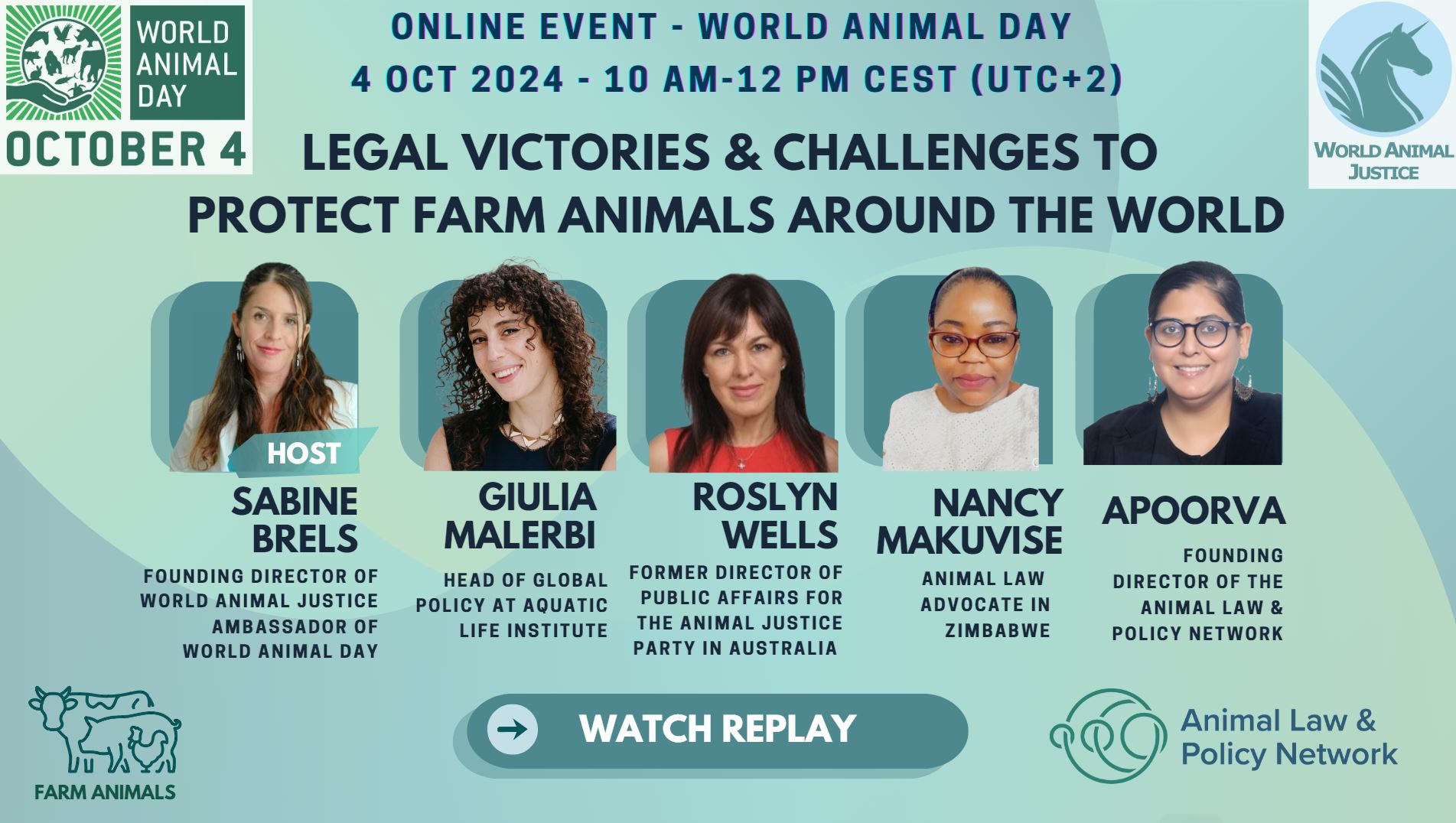Proposed Strategy to Ban Cruel Practices: How to Achieve Successful Legal Changes for Animals?
On World Animal Day 2024, leading animal lawyers and advocates from across the globe united in a pivotal webinar hosted by World Animal Justice (WAJ). The event, Legal Victories and Challenges to Protect Farm Animals Around the World, featured Sabine Brels (WAJ Director), Roslyn Wells (Australia), Giulia Malerbi (Italy), Nancy Makuvise (Zimbabwe), and Apoorva (India). Together, they shared invaluable insights into tackling the challenges of enacting legal reforms to end cruel animal practices.
The webinar culminated in the introduction of the WAJ 7-Step Strategy to Achieve Legal Change for Animals and Ban Cruel Practices. The proposed strategy is not a one-size-fits-all solution but a set of guiding principles informed by global expertise and adaptable to local circumstances. It serves as a practical framework for animal advocates, recognizing the diversity of approaches required to achieve meaningful policy and legislative changes across regions and cultures.
Understanding the Landscape of Animal Cruelty
Ending cruel practices towards animals is a complex and multifaceted challenge. It requires navigating legal systems, cultural norms, and economic interests. Despite the hurdles, the path forward is illuminated by past victories, collaboration, and unwavering dedication. The WAJ- 7 Step Strategy reflects this spirit, offering a pragmatic yet hopeful guide for advocates to take decisive action.
This strategy emphasizes that success is not achieved through a magical formula but by thoughtfully addressing the unique political, cultural, and social contexts of each country. It also acknowledges the legitimacy of diverse approaches, including compromise with opponents, as long as the ultimate objective of ending animal cruelty is upheld.
7 STEP STRATEGY TO BAN CRUEL ANIMAL PRACTICES
This first draft of WAJ 7 Step Strategy to Ban Cruel Animal Practices is a key outcome of WAJ Webinar on ‘Legal Victories and Challenges to Protect Farm Animals Around the World’ involving key animal law experts who could achieve legal changes for animals around the world: Roslyn Wells (Australia), Giulia Malerbi (Italia), Nancy Makuvise (Zimbabwe), Apoorva (India).
1. Know the Truth and Use It in Advocacy
Evidence is the foundation of advocacy. Documented investigations and robust scientific research are essential to exposing the reality of animal cruelty. Advocacy campaigns must be built on irrefutable truth to convince policymakers and the public alike.
2. Prepare the Legal Proposal and Strategy
A clear and well-structured legal solution is vital. Advocates must not only articulate the problem but also present actionable steps for reform. Understanding and countering opponents’ arguments strengthens the proposal’s viability.
3. Raise Awareness and Mobilize Public Support
Public opinion can be a powerful force for change. Polling community sentiment and amplifying voices through mainstream and social media can galvanize widespread support. A united public stance creates pressure that decision-makers cannot ignore.
4. Identify and Seek to Influence Key Decision-Makers
Engaging with policymakers, legislators, and other key stakeholders is critical. Advocates should come prepared with tailored talking points and information to build political support. Tools like petitions and email campaigns can effectively highlight issues and apply pressure.
5. Seize Political and Media Opportunities
Opportunities to advance the agenda often arise in the shifting landscape of media and politics. Staying alert to societal developments, hosting events, and participating in protests or international forums can amplify the cause and attract media attention.
6. Collaborate with Allies and Watch Opponents
Collaboration is key. Aligning with like-minded organizations and individuals strengthens advocacy efforts. At the same time, monitoring opponents’ actions ensures preparedness to counter resistance with persuasive arguments.
7. Maintain Pressure Until the Outcome is Secured
Persistence is non-negotiable. Advocates must anticipate backlash and be prepared with counterstrategies. Keeping the pressure on until the desired outcome is achieved is often the deciding factor in success.
Beyond the Strategy: Adaptability and Resilience
The WAJ strategy recognizes the importance of adaptability. No two campaigns are alike, and varying contexts may require innovative approaches. The framework encourages advocates to remain open to diverse strategies, including collaboration or compromise, as long as they advance the ultimate goal of justice for animals.
This roadmap is not merely a checklist; it is a dynamic guide designed to inspire action, collaboration, and resilience. It is a call to all who seek to challenge and change the systemic cruelty inflicted on animals across the globe.
Let this strategy serve as a beacon for advocates striving to achieve legal change. Together, we can pave the way for a world where cruelty towards animals is no longer tolerated, and justice for all living and sentient beings prevails.
The WAJ 7-Steps Strategy to Ban Cruel Practices is a powerful starting point. While not exhaustive or universally applicable, it provides essential guidelines and expert insights to help advocates navigate the path to ending cruel practices towards animals. Let us move forward with determination. Every step we take is a step closer to a world of justice for all animals.



